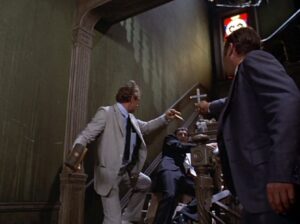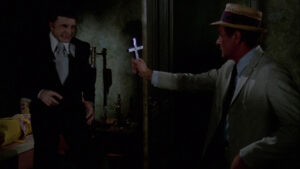The Night Stalker (1972) review
Dir. John Llewellyn Moxey
By: Steve Pulaski
Rating: ★★★
The most-watched TV movie at the time of its premiere on ABC in 1972, The Night Stalker retains its infamy for being the launchpad of Kolchak: The Night Stalker. The series itself was short-lived compared to its contemporaries, at only 20 episodes, but to this day retains a cult following. Without it, there’s a good chance Chris Carter would’ve never been inspired to the extent he was to create The X-Files, one of the most enduringly popular sci-fi shows of its time.
Viewed today, The Night Stalker is far more successful at its aspirations of being a blackly funny, cynical police procedural than it is at cultivating supernatural elements. The bulk of the picture is talky and reliant on narration, which works to its credit as it wraps you in a narrative with a world-weary investigative journalist at its center. Screenwriter Richard Matheson makes an admirable attempt to transition the tone to horror in the third act, and although unsuccessful, there is undeniable high-level filmmaking present over the course of this briskly paced, 74-minute flick.

The Night Stalker opens with journalist Carl Kolchak (Darren McGavin) listening to a replay of his dictated notes about a series of murders that occurred along the Las Vegas Strip. This would later become the framework employed by the film’s eventual sequel and the eventual TV series. Kolchak arrives in Vegas a journeyman newswriter, incapable of holding a job for any length of time, and with a seemingly unrivaled ability to agitate and alienate sheriffs and fellow investigators as he tries to cough up a theory.
The victims of the Vegas killing spree have various details in common: they are all young women, many of whom showgirls, their corpses harbor severely large bite marks, and all have been drained of their blood by the time their bodies are recovered. Kolchak really starts to piss off his cohorts — Sheriff Butcher (Claude Akins), Police Chief Masterson (Charles McGraw), and District Attorney Paine (Kent Smith) — when he begins opining, based off the boy coroner’s reports, that the suspect could be a vampire. The powers that be stonewall Kolchak’s attempt at publishing such a report despite a more conventional explanation being nonexistent.
One of The Night Stalker‘s most compelling layers is Kolchak himself. McGavin plays the career newspaperman as quietly desperate yet completely justified and noble in his convictions. He also delivers humorously sardonic lines with the deadpan gift predictably mastered by men of Kolchak’s profession. When he gripes to his girlfriend Gail (Carol Lynley) about his inability to go public findings of the killer, he sulks as he nurses a drink: “I’m becoming extinct in my own lifetime. Homo Newshawkus: natural habitat, a pool of sour-mash bourbon.” There’s a line as delightful as the first sip of the good stuff.

At barely over an hour, The Night Stalker has hardly any time to waste. Its prime suspect is revealed merely 30 minutes in, and the bulk of the third act is a wordless confrontation with Kolchak and the presumed vampire involving silver, a wooden stake, and a mallet, for of course it does. Director John Llewellyn Moxey slowly darkens the visual look of the film, Bob Cobert’s music turns from poppy to sinister and synth-y, and all of a sudden, it’s Darren McGavin vs. Barry Atwater. Alas, the supernatural elements don’t converge into something that is particularly spine-chilling. For too long prior, the film was successfully functioning as a procedural, so this tonal shift is effective mostly as a change-of-pace as opposed to a quality showcase of the story’s inherent horror.
It’s easy to see why The Night Stalker resonated with millions upon release. It came at a time when public distrust of authority figures was quickly brewing. The Nixon administration was rapidly losing its grip on a nation disillusioned by political scandals and the Vietnam War (and the horrors television helped bring into our homes). Here’s an unassuming TV movie about a downtrodden journalist trying to feed information to the public while simultaneously being kicked to the curb by the powers that be. In addition to feeling just as relevant today as it did in the 1970s, The Night Stalker could accurately be described as an example of the “slobs vs. snobs” narrative. But even someone as deprecating as Kolchak would probably scoff at the notion of being called a slob.
My review of The Night Strangler (1973)
Starring: Darren McGavin, Simon Oakland, Carol Lynley, Barry Atwater, Claude Akins, Charles McGraw, and Kent Smith. Directed by: John Llewellyn Moxey.
About Steve Pulaski
Steve Pulaski has been reviewing movies since 2009 for a barrage of different outlets. He graduated North Central College in 2018 and currently works as an on-air radio personality. He also hosts a weekly movie podcast called "Sleepless with Steve," dedicated to film and the film industry, on his YouTube channel. In addition to writing, he's a die-hard Chicago Bears fan and has two cats, appropriately named Siskel and Ebert!


